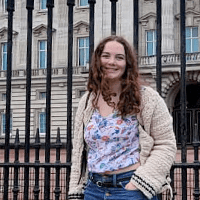
My name is Shannon King. I’m an Applied Linguistics and Multilingualism major with a minor in Linguistics and a teaching certificate in TESOL, and I studied in UCEAP’s University of Bordeaux program during Fall 2021.
Studying away as a Queer Swedish-American led me to some of the best and most challenging times of my life. I experienced a lot of personal growth while I was abroad and would not trade my experiences living halfway around the world for anything. These experiences include meeting lifelong friends and gaining educational opportunities beyond what I would have received on campus at UCSC.
As a linguist, I held my naive notions that studying abroad was the end-all be-all of language acquisition. But I found my experience in France to be nothing like what I had expected, especially in regard to how my identity played into my experiences.
For starters, I was wholly and completely unprepared for how close-minded some of the host locals were towards Americans. Specifically, one teacher would routinely call me the “stupid little American” in class where I was the only non-French student. This professor would also ask me to explain topics including gun control, Trump and his term as president, abortion, organized religion, and standardized testing. After my best attempts to explain these complex topics in a foreign language, the professor would point out that I made basic language mistakes, seemingly forgetting that I was a French language learner. But not all professors were like this.
In contrast, the professor for my Basque Linguistics class was warm and welcoming. She took the time to help me relearn the niche linguistic vocabulary in French so that I could best participate in class discussions and provided me with additional resources that I could use when I returned to the states. The duality of explicit hostility and welcoming sums up most of my experiences in France.
My identity was constantly changing while I was abroad. I quickly learned that it was better to introduce myself as a Swedish exchange student rather than an American exchange student. However, this shift brought confusion when I explained that I was on an American university program. My Swedish identity would often be nullified since I would hear “well, you have an American passport, so you are American, not Swedish”. Some of the French people I met seemingly do not have as broad a notion of multiculturalism as we are used to at UCSC.
Lastly, I was a queer student studying in a Catholic country. It was difficult to find spaces to express my queerness where I would not be fetishized by onlookers, or glared at by traditionalists. While many students I met at the university were open and accepting, that did not extend to the city where the “you can exist but not in public” standard seemed to reign supreme. With the exception of Pride, the rest of my term was spent being more or less closeted.
With these challenges in mind, you may be feeling discouraged to study abroad in France as a non-French person, but do not let them keep you from going abroad. The experience is still worth it, you just need to have the right mindset. Making friends with other international students going through similar experiences, going to English bookstores, or finding comfort food from home are just some ways to feel more comfortable when you inevitably are met with microaggressions. Additionally, it is important to utilize online therapy services when you can. Mental health services in France are not as robust or accessible as services here in the U.S. so it is a good idea to take advantage of online services to work through mental health conditions like anxiety or depression.
Good luck, and happy traveling.
